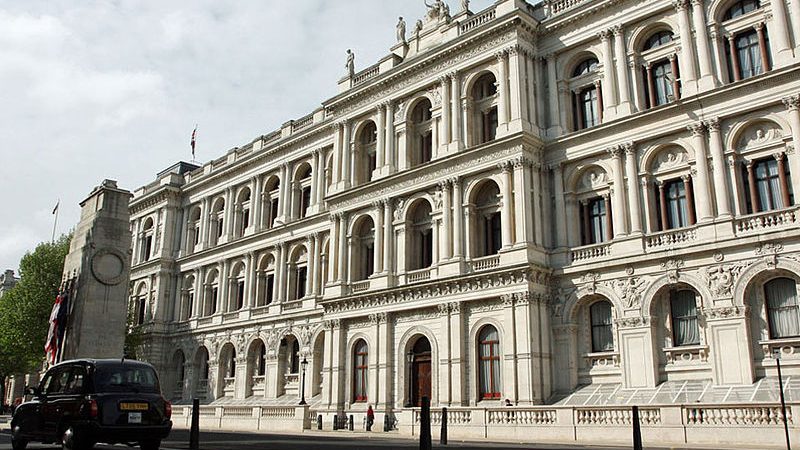
Almost 20 years ago, when we were still in school, the 9/11 attacks in New York set in motion events that changed our lives, those of our families and impacted the way we viewed the world. They set in motion the ‘War on Terror’ – the invasion of Afghanistan in 2001 and Iraq in 2003 – that still defines much of the United Kingdom’s foreign policy landscape today. But the landscape has undeniably changed.
Our multilateral institutions, built to solve the problems of the 20th century, have suffered from paralysis when faced with the multifaceted, fast moving and complex global issues of today. Global cooperation is crumbling in the wake of an increasingly isolationist US under Trump and increasingly assertive Russia and China under Vladimir Putin and Xi Jinping. And in the UK, Brexit has unearthed fundamental questions about our identity and place in the world that are wanting for answers.
Covid-19 is putting additional pressure on these trends. The need for global cooperation is confronting nationalist tendencies. We have been forced to look at our political leadership and our relationship with other nations in ways that foreign policy challenges have not demanded of us in the past.
There have been rays of hope. In 2015, the world came together to agree the UN sustainable development goals. Around the world, people are fighting for democracy: in Hong Kong, Belarus and Lebanon people are rising up against the forces of authoritarianism and corruption. And over the past few years, we have seen a democratic revolution in how foreign policy is done. We have seen young people like Malala Yousafzai and Greta Thunberg influence the agenda of international institutions.
We have seen climate protests and social justice movements light up the streets and squares of cities far from their ignition points. People harnessing social media and communications technology to build global movements for change. Cities and communities are also playing a leading role in defining their countries’ relationships with the rest of the world. No longer is foreign policy simply seen as the preserve of the elite.
The changes we have witnessed over the past few years require a new story about Britain’s place in the world – one that acknowledges and is humble about our historic role but builds on our strengths and values.
The Labour Party has a unique window of opportunity over the next four years to take stock and articulate a truly new and progressive approach to the UK’s relationship with the world. Under the leadership of Keir Starmer, it has an opportunity to dig deep into defining this new approach and to involving its members. There is a raft of experience amongst party members that could contribute to this process in a coordinated manner.
We know that this is no easy task. Over the past few years, we’ve both been part of a number of conversations attempting to define a new progressive foreign policy. But far too often these end in vague proclamations or break down because participants cannot move beyond their own narrowly-defined interests. Foreign policy also remains a divisive subject for party members.
We want to remedy this. We believe we can start to harness the expertise that exists within the party and facilitate the right types of conversations: conversations about our role in the world, what our relationships with other nations post-Brexit look like, how we deal with the trade offs that inevitably come from operating in a globalised world, and what values underpin this. This is why we founded the Labour Foreign Policy Group.
We want to look at our strategic relationships post-Brexit and also our role in dragging multilateral institutions into the 21st century. We want to explore how we do foreign policy differently, by harnessing new actors and new technologies, and to tease through what implementing a progressive foreign policy actually looks like for Britain in the 2020s.
The UK needs a sophisticated response to the key policy challenges which will define the coming years outside the Covid-19 crisis. It must respond to an evolving agenda in areas including trade, development, climate, peace, diplomacy, technology and security. Equally it must respond to wider geopolitical tensions and shifts, and Britain’s evolving relationships with its allies and rivals. This means moving beyond the politics that has defined our approach to foreign policy for the past 20 years.
With just under four years to the next election, Labour has the opportunity to play a leading role in defining the UK’s new relationship with the world – its priorities, its values and its orientation. In the current climate of political activism where people’s voices have the power to elevate issues that change their lives, Labour needs to seize its moment and define its approach to foreign policy – one that breaks from the past, draws on our values, and is well-evidenced, coherent, inclusive and progressive. We hope to play a big part in that journey.
Labour Foreign Policy Group is launching on Monday 21st September at 6.30pm with an event featuring former Deputy Prime Minister of Sweden Margot Wallstrom and Shadow Foreign Secretary Lisa Nandy MP. They will be discussing how to build a coherent and progressive foreign policy. For more info and to register, click here.
Interested in becoming a member of LFPG? Click here. Or to join our mailing list, click here.




More from LabourList
‘Ukraine is Europe’s frontier – and Labour must stay resolute in its defence’
Vast majority of Labour members back defence spending boost and NATO membership – poll
‘Bold action, not piecemeal fixes, is the answer to Britain’s housing shortage’